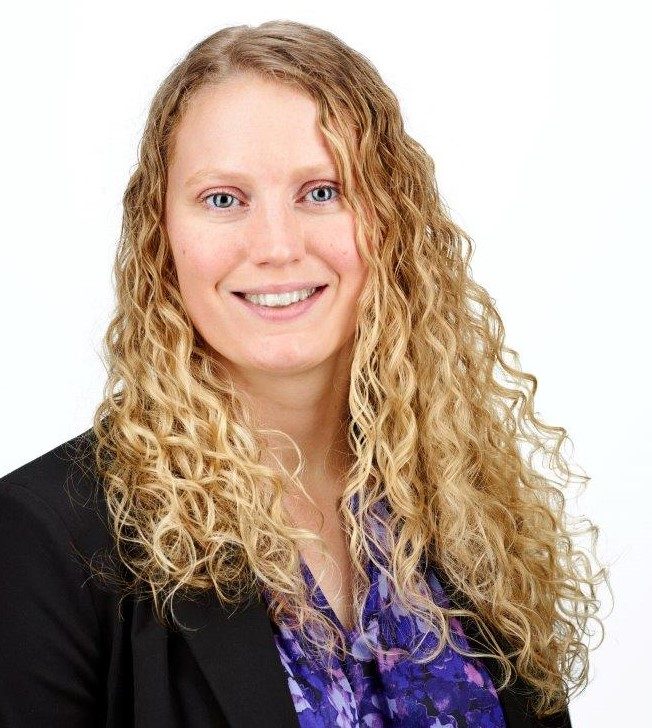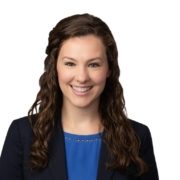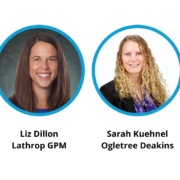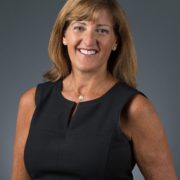Spotlight on Flex – Sarah Kuehnel
The Spotlight on Flex showcases professionals from member organizations who exemplify personal and professional success while working a flexible schedule. Their stories illustrate the long-term benefits that flexible schedules offer to both individuals and organizations.
This month, we are pleased to share insights from Sarah Kuehnel, Associate, Ogletree Deakins, St. Louis, MO
 Diversity & Flexibility Alliance: How have you made flexibility a priority and a success through your schedule?
Diversity & Flexibility Alliance: How have you made flexibility a priority and a success through your schedule?
Sarah Kuehnel: Flexibility has always been important to me because my husband has been in the military my entire career. As a second year associate at Ogletree, I first switched to a flex schedule in late 2010 because he was being deployed in January 2011. The firm was incredibly generous and let me adjust my schedule to a 50 percent reduced-hours target for the last two months of that year.
In 2011, my husband was selected for the Army Special Forces. We consciously decided that his career would take precedence since it had a tangible time limit (both from a physical and career development aspect). I was passionate about my career too, but with a limited amount of time, my husband had to advance in his career first. My original thought was to quit the firm since his career would require us to move and live in several different states over the next few years. I went to the managing shareholder to discuss my options. Rather than let me quit, Ogletree once again, was incredibly supportive, and agreed to let me work 100 percent remotely out of the St. Louis office on an hourly basis. Because the arrangement was a success, in 2014, I went to a 75 percent reduced-hours schedule. I now work at an 85 percent reduced-hours schedule – all the while continuing to work remotely for the St. Louis and now Tampa offices.
I’ve made flexibility a success by working remotely for more than six years. I was 100 percent remote in 2011 while we lived in Kentucky and from 2012-2014 when we lived in North Carolina. I’ve been working remotely in Destin, FL since August 2014. Once I knew we would be in Destin for several years, at my request, the firm sponsored me to take the Florida Bar. Now about half of my work is in Florida and the other half is in St. Louis. I travel back to St. Louis about once a month, and this travel is also covered by the firm. This arrangement has worked out very well because when my husband is gone, I stay longer in St. Louis (which is home for me). When he’s stateside, I try to limit my time in St. Louis so we can be together.
Since my husband is deployed so often, our time together is very important to me. If Ogletree hadn’t been supportive of my “ask,” I don’t know where I would be in my career or if I would even have a career at this point. The firm has given me the technology and resources to perform my job as if I were 100 percent physically present in St. Louis. More importantly, Ogletree has made it possible for me to succeed and progress in a career that’s not always portable.
As an employment litigator, this arrangement works for me because I plan ahead and remain flexible when plans change. Planning is incredibly important even though so much of it is out of my control – we could win summary judgement or settle the case as we are preparing for trial. Now that I’m taking the lead in more matters, I have more control over scheduling mediations and depositions. Sometimes I have to push work up or down, but I like to take the lead whenever I have the opportunity. I’ve also started taking on more work in North Florida, which requires less travel and juggling schedules. I’m able to leverage my location into an advantage for the firm since we don’t have an office in the panhandle area.
DFA: How have the firm and clients contributed to your flex success? How has flexibility contributed to your business development and sustainability of working at a firm?
SK: I have a handful of clients in the panhandle who know I work remotely for Ogletree, and my St. Louis clients know I work remotely too. All of them, and everyone at Ogletree, are incredibly supportive. In this day and age, technology is so effective that it makes remote work seamless.
Flexibility has contributed to my business development because Ogletree doesn’t have an office in the Florida panhandle – our closest office is about four hours away – and working remotely here has allowed me to target new clients where we did not previously have a physical presence. I also make sure I market myself internally and make plans to meet with partners and clients anytime I’m physically in an office for work. I always let people know that through me, the firm has a presence in the panhandle of Florida, and I can be a local resource for them.
DFA: Looking back, what would you tell your first year associate self? Would you do anything differently?
SK: I would tell my younger self three things. First, don’t assume the answer to something you want or need is “no” just because no one else has asked before. We sometimes let assumptions take over, especially in big law, and a lot of times it’s because no one has asked the questions before. No one would have offered to pay for me to take the Florida bar had I not asked for it. I made the case as to why it would benefit the firm, and the firm embraced and supported my plan to our mutual benefit.
Second, I would tell myself to focus on the big picture. It’s easy to get lost in the day-to-day grind, making your hours, or sending something off to the client. But as I’ve progressed in my career, it’s been helpful for me to focus on the end game instead, figure out my ultimate goal, and how to get there. Set the time aside now to make this work in the future. I’m up for shareholder, so I’ve been increasingly focused on my marketing efforts since early this year. Starting earlier certainly would not have hurt.
Third, I’ve learned it is important to embrace your personal boundaries, and do what you need to do for your mental health. These are both so frequently overlooked. We really have to take care of ourselves and make these priorities. It’s ok that it looks different for everybody.
DFA: How do you pay it forward, and how do you recharge your batteries?
SK: Planning ahead is essential to paying it forward. When I give work to younger associates, I make sure I’m clear on deadlines to avoid associates working on weekends. I also encourage younger associates to take time off and tell them not to work on my projects on nights or weekends when it’s not necessary. When the shareholders I work for need help, I’m ready to assist in any way I can. If I can make their lives easier, then I do since they have been instrumental to my career success.
Responsiveness is huge to client satisfaction, but it doesn’t mean I can’t unplug for an hour to do yoga, exercise, or simply not look at my phone. When I take trips, I set boundaries, try to limit checking email, and use the rest of my time to disconnect
If you are a professional working a flexible schedule and would like to share your story in an upcoming Spotlight on Flex, contact Eliza Musallam.






